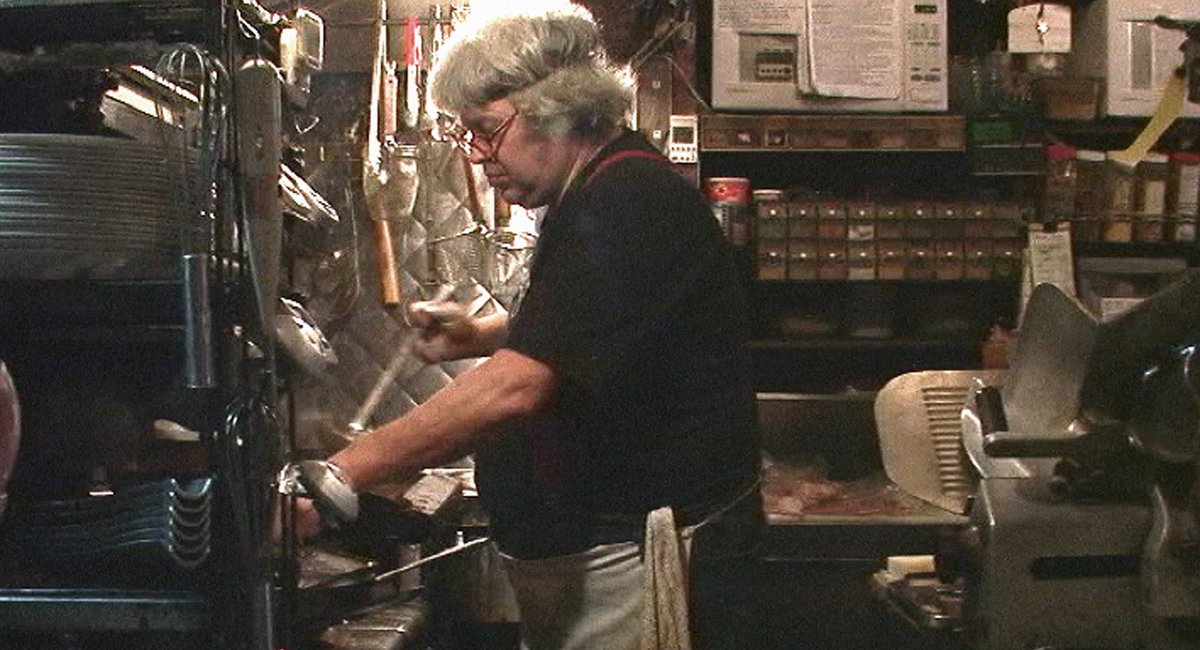From 2002 to 2003, director Matt Mahurin documented chef and cantankerous philosopher Kenny Shopsin in the final days of his eponymous eatery’s original location.
The resulting film, “I Like Killing Flies,” became a New York City cult classic, depicting Kenny, his wife Eve and their five kids as they made a new home for the local Bedford Street institution a few hundred feet away, on Carmine Street.
The film, which was unavailable for years due to licensing complications, but is finally streamable as of this summer, captured the Shopsin clan and their world of pre-gentrified, very-early-2000s Greenwich Village. Many neighbors were restaurant regulars or at least cared about Shopsin’s and the social fabric of their community (and not pissing off Kenny) in a way that contrasts sharply with the neighborhood’s cleaned-up corporate landscape today.
Kenny spends most of the film reaming customers with impossibly thick New York accents, cooking up mouthwatering, inspired dishes with abandon for city health department standards, and giving cynical sermons from the pulpit of his kitchen.
“Flies” distributor ThinkFilm exclusively licensed the movie to Netflix in 2004, when the company was a subscription DVD-by-mail service. Mahurin admits he once rented the film on Netflix and didn’t return the DVD: “I wanted my little Netflix white-and-red envelope.”
When ThinkFilm went insolvent a few years later, “Flies” fell into a state of license limbo.
“There was no way to get the film out into the world,” Mahurin said. “ I’d get letters from people, ‘My house burned down and this was my favorite film’ and ‘My son-of-a-b—- boyfriend took my copy and there’s none left. Do you have any?’ It was killing me.”
The rights eventually reverted back to him, and in 2021 he began collaborating with Oscilloscope Laboratories — the indie film company founded by late Beastie Boy Adam Yauch — to restore and rerelease the movie.
Now, the dream has been realized at last. “I Like Killing Flies” is freshly available to rent and download on a variety of streaming platforms, including Amazon, Google Play and YouTube. Oscilloscope is selling DVDs and Blu-Rays of the film for around $30. In conjunction with the release, Manhattan’s Firehouse Cinema will hold two special screenings of the documentary on Oct. 8 and 9.
The film’s title comes from an existential and geopolitical commentary Kenny offhandedly gives mid-shift to explain his theories on the root of all evil and why he has an electric bug-zapper in the kitchen. After a casually profound assessment of American foreign policy and the ouroboros of war breeding internal enemies, Kenny concludes: “Anyway, I like killing flies.”
In another scene — shortly after cuts of customers contentedly admitting they’re not sure what they’re eating and Kenny mixing a salad barehanded — Kenny explains how he recently created a barbecue banana split by pairing ice cream and bananas with pulled pork and coleslaw.
“There’s a friction that occurs when you put an ingredient in an improper dish,” he says. “There’s a sexual friction caused by putting the wrong food in the wrong place. And sometimes it works. But not always.”
Mahurin is ecstatic that “Flies” is at last widely available. If only Kenny were around to watch it again.
Kenny “was not the sort of person for whom death ever seemed a possibility,” food journalist Helen Rosner wrote in a 2018 New Yorker obituary. He was 76 at the time. His wife, Eve, with whom he reared the restaurant business and five children, died at 57 in 2003, during the making of the film.
It’s somewhat surprising the film happened at all: Kenny was famously publicity-averse, as publicity led to new customers, which often proved a nuisance to him. He had his regulars, and they understood his many rules, including: no parties larger than four, no having what your neighbor was having, know how to order from the hundreds of menu options and know how to not be annoying.
After he lost his lease on Bedford Street, Kenny made a rare request: He asked Mathurin to document the place.
“He kicked people out, you know, he cursed them out. And I was shocked that he asked me to do this,” said the director, adding he was honored to do so.
“I would go in there and, behind this Frankenstein stove, he would offer up these morsels of life, death, sex, politics, and even food. And I just watched this guy and I said, he’s like a living piece of American folk art,” Mahurin said. “What he had to say definitely transcended the four walls of this kind of bohemian eatery in the Village.”
Kenny’s son, Zack Shopsin, said he’s mostly grateful the film exists to preserve his father’s memory.
“ I tried to watch 15 minutes of the movie a few months ago and I just cried uncontrollably,” he said. “ My parents are both dead, so, you know, it’s sad. I miss them. But I’m very fortunate to have them documented, and the old store.”
Zack is the day-to-day guy at Shopsin’s current incarnation at Essex Market, where old regulars still come, often with their kids in tow.
“I’m pretty much there all the time,” Zack said. He sounds uncannily like his father and, like his father, often yells at people, much to the delight of longtime regulars.
“There’s been, like, annoying old ladies in here and I’ll call ’em f—ing a–holes, and they’re like, ‘Aww, you’re just like your dad.’”
